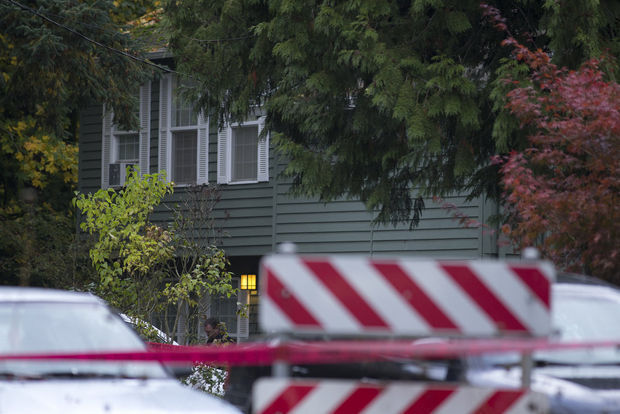
The house where Nicolette Elias, a victim of intimate partner violence, was found.
An Oregon circuit court judge, Amy Holmes Hehn, has been presiding over a contentious custody case. In an editorial in The Oregonian (reprinted here with permission), Hehn tells us how we can change our thinking and end the cycle of domestic violence.
On Nov. 10, Ian Elias kicked in the door of the home of his ex-wife, Nicolette Elias, and shot her to death with a handgun. He took their two young daughters to his home where he ultimately stepped out into the back yard and shot himself in front of police.
I am the Multnomah County Circuit Court judge who has been presiding over Ian and Nikki Elias’ highly contentious custody and parenting-time case. Everyone connected to the case is heartsick. Nikki Elias was a smart, articulate, hard-working, loving mother to her two children. All of the professionals in the case, including the court, were extremely concerned about Ian Elias and took his behavior seriously. Nikki was clear with us all about how dangerous she thought Ian was and we believed her. She sought and was given all the protection the court has to offer. She did everything we like to think of as “right” to protect herself and her children from Ian’s abuse. In the end, none of our efforts were enough. The grim reality is that when an abuser wants to murder his intimate partner, he’ll likely find a way to do it.
As a professional who has fought the good fight against domestic violence throughout my 27-year career, first as a prosecutor and now as a judge, it’s hard not to give up in despair. As a society, it’s tempting to throw up our hands and walk away saying, “there’s nothing we can do.” That would be a mistake. There’s a lot we can do.
First, we must shatter our myths and biases about domestic violence:
- With rare exceptions, domestic abusers, including those who murder their partners, aren’t “crazy.” While Ian Elias suffered from anxiety and depression, he wasn’t insane; he was arrogant, entitled, abusive, selfish and controlling. He played the victim at every turn. When the court held him accountable for his conduct and put limits on his behavior, he reacted with the ultimate narcissistic act of control, with no concern for the children he professed to love so much.
- Domestic abusers don’t have “anger management problems.” They are generally able to manage their anger just fine outside the home. An abuser uses his anger as a tactic to punish, control, terrorize and coerce his partner to achieve specific goals – to shut her up, to isolate her, to prevent her from spending money, to keep her from complaining about his infidelity, to keep her from asserting her independence. In this way domestic violence is “functional.” It’s always a conscious choice, and sadly, too often it works.
- We should never again ask, “Why doesn’t she just leave?” Nikki Elias, and thousands of others like her who end up dead at the hands of their abusers in this country every year, did leave. Leaving is the most dangerous step a victim can take. When we hear about a victim of domestic violence we so often want to know what’s wrong with her and wonder what she did to deserve the abuse. This supports the abuser’s world view, that his abuse is justified. When a victim of domestic violence stays or returns to her abusive partner, what we should be asking is, “What are the conditions he created to cause her to feel that she has no other safe choice but to stay?”
- Some of the worst domestic violence isn’t physical; it’s verbal, emotional and psychological. While Nikki reported extensive past physical abuse by Ian, including grabbing, punching and strangulation, more recently Ian terrorized Nikki using social media. His postings were not overtly and specifically threatening to her, however, and thus were protected by the First Amendment. This is a huge gap in our ability to intervene on behalf of victims.
- Domestic violence isn’t something that just happens to “those people.” It cuts across all races, ethnicities, sexual orientations and socieoeconomic classes. Chances are someone you know personally has been a victim of domestic abuse.
Second, we must step up and speak out. Domestic violence is preventable. - Men need to start standing up to men about domestic violence. For too long the fight against domestic violence has been fought by women talking to and on behalf of women. Until men own the fact that, while there are certainly exceptions, domestic violence is primarily perpetrated by men against women and children, abuse will continue. It was refreshing to finally see men of power and privilege speaking out against abuse in response to recent revelations about domestic violence among high-profile sports figures. Corporations with substantial influence pulled contracts from abusive players. At last, domestic violence seemed to be impacting the status and pocketbooks of men in a mostly man’s realm, the world of professional sports. This is a trend that should be supported and encouraged.
- Everyone needs to educate themselves about domestic violence. Most survivors turn first to friends, relatives, employers and co-workers for help.
Domestic violence pervades every type of case in our legal system. Judges and other legal professionals must be vigilant and educated about the dynamics of domestic violence and about factors known to be linked to high risk and lethal violence in order to recognize it and respond appropriately. - We need to put money where our mouths are. Consider the public attention and resources focused on the Ebola outbreak in recent months. Yet how many Americans have actually died from Ebola? Since 2003, 18,000 women have been killed by their intimate partners, yet domestic violence services, including advocacy for survivors, safe housing, resources to help survivors achieve financial independence, specialized domestic violence law enforcement and prosecution units, and services for perpetrators are all grossly under-funded. Until we embrace domestic violence as the public health crisis it is and put our resources there, abuse will continue.
- We need to talk about guns. Women who are victims of domestic violence are six to eight times more likely to be killed by an intimate partner if there are firearms in the home. “[A]ll too often,” as former Sen. Paul Wellstone, D-Minn., noted during a 1996 debate over federal legislation, “the only difference between a battered woman and a dead woman is the presence of a gun.
- If you see or hear abuse happening, call 911. She may not be able to do so safely, but you can. If you have a friend, relative, neighbor or co-worker who is being physically or emotionally terrorized by her intimate partner, reach out. Listen and sympathize without judgment or blame. Don’t tell her what to do. Instead, ask her what she needs to be safe and do your best to support her.
Our good efforts weren’t good enough to save Nikki Elias. If we all pull together, perhaps we can save the next wife, mother, sister, brother, daughter or child, and the next.
Amy Holmes Hehn is a Multnomah County Circuit Court judge. This editorial has been reprinted from The Oregonian with permission from the author.














